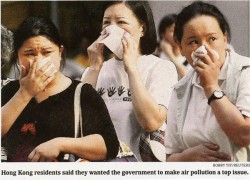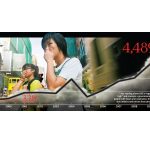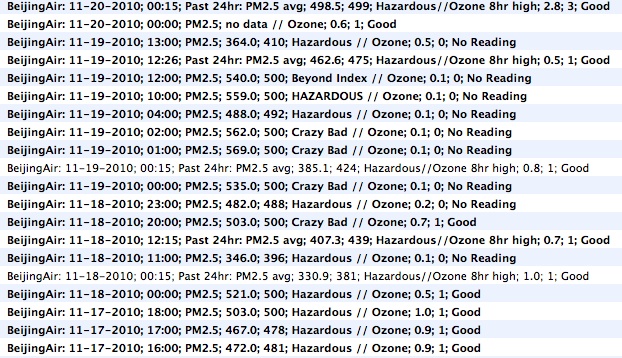Expert warns policymakers yet to address most health-threatening of
contamination problems
Sunday, 06 January, 2013, SCMP
http://www.scmp.com/news/china/article/1120912/chinas-heavy-metal-and-chemical-pollution-worsening
A senior
environmental policy official has warned the mainland faces an “extremely grave” environmental crisis that will only worsen as pollution
increases and the health problems its causes come to light.
Wang Jinnan, a deputy director at the Chinese Academy of Environmental Planning,
told a three-day conference at the Chinese University of Hong Kong that the country has not yet come to grips with the amount of toxins
seeping into the ground, pollution that would linger for decades to come.
So far the article in the SCMP. Read more about the dramatic
environmental destruction in China in “Toxic Capitalism” (water, air, soil).
The situation is indeed very grave, especially for water
resources that are already limited but also too polluted. On the other hand the government is well aware of the pollution and the impact on
health. The 12th Five Year Plan and other initiatives from the government show evidence China wants to turn the tide. The new team at the top
has put the environment as one of the top priorities. However, if the fight against corruption, the improvement of governance and the changes
in Western consumption are not carried out there is little hope. The West is also to blame for its hypocrisy, blaming China for the pollution
and poor labor conditions while refusing to insist on quality and durability while paying a fair price. And stopping its habit of buying junk
at rock bottom prices to satisfy the orgy of consumption. We all have to contribute to change things.
Alaska oil rig grounding refuels Arctic drilling debate
As reported by Reuters in Washington and the SCMP, opponents of Royal Dutch
Shell’s ambitious Arctic oil program have called on the Obama administration to put offshore drilling plans in the region on hold after one
of the company’s oil rigs broke away from tow boats in high seas and ran aground off Alaska. The accident involved Shell’s Kulluk oil rig;
it is one more evidence oil companies are not prepared to safely manage extreme conditions in the new drilling methods, such as in of the
Arctic.
As I demonstrate in my book Toxic Capitalism, our society is brainwashed to consume and consume. Unfortunately, to manufacture all
those (often useless) consumer goods, we pollute our planet and need more and more energy resources. We can only slowdown this vicious circle
by consuming less – and consuming wiser through quality and durability.
We cannot stop going into new technologies and into new areas of
exploration. However, it should require careful analysis and without cutting corners. Oil and gas companies show through the approach in
fracking and drilling that they cut corners so the gas and oil remain cheap. This is a terrible risk and once again it means shifting the
problems to future generations. Remember Deepwater Horizon?
Gilbert on China Radio International, Portuguese section
(follow details in Portuguese about the interview on CRI about the
environment and my book Toxic Capitalism)
Uma conversa sobre questão ambiental na China
2012-12-31 15:54:18
cri
http://portuguese.cri.cn/721/2012/12/31/1s160419.htm
A questão ambiental se tornou um dos maiores desafios que a
China enfrenta para levar adiante seu desenvolvimento socioeconômico. O país está ciente do problema e começou a tomar medidas concretas.
Acompanhe nesta edição do programa Oriente-se a conversa entre Luiz Tasso Neto e Inês Zhu sobre o tema. Escute também a entrevista com o
belga Gilbert Van Kerckhove, autor do livro Capitalismo Tóxico, que aborda o mundo do meio ambiente, focando a situação na China.
Pode
ouvir aqui: http://src.cri.cn/rio/121231/oriente1229.mp3
Do the Chinese care about “green products and companies”?
I am frequently being asked how the Chinese feel about Global warming and if
they care about green products or green companies.
In “Toxic Capitalism” I refer to a study done by The Carbon Trust. It made a survey of
2,800 young people across six countries that found that 83% of eighteen- to twenty-five-year-olds in China would be more loyal to a brand if
they could see it was reducing its carbon footprint. Just 57% of U.S. respondents and 55% of young people in the U.K. made the same claim.
Globally, 78% of young people said they want their favorite brands to reduce their carbon footprint, but again the Chinese showed the highest
demand for emission reductions, with 88% calling on firms to cut their footprint.
In the FCCC Environment Newsletter No 35 (done by my friend
Michel Lens), another survey confirms the trend, see here the full text:
The vast majority of Chinese believe climate change is taking place
and most consumers are willing to pay more for eco-friendly products to reduce its effects, a survey by the Center for China Climate Change
Communication has found. Some 93% of respondents said climate change is under way, while about three out of five respondents feel they have
been directly affected by it. The study of 4,169 Chinese adults was carried out from July to September.
About 68.4% of respondents said they
thought China has already suffered from the effects of climate change, while about half of respondents said it will affect people in rural
areas more.
About 90% of respondents said the government should have prime responsibility for dealing with climate change, followed by the
public, media, companies and NGOs. Zheng Baowei, Director of Renmin University’s Research Center of Journalism and Social Development, said
the government should play a dominant role in adopting measures and designing policies in line with the public’s expectations and interests.
More than 93.4% of respondents felt they have knowledge of climate change, while just 6.6% said they had never heard of it. About 60% thought
climate change is mainly caused by human activities, while 33% considered it to be mainly caused by the environment. Some 87% of those
surveyed said they were willing to pay more for greener products, while more than 34% said they would accept a 30% price rise to buy such
products. More than four out of five respondents said they supported the government in setting standards for mandatory garbage separation and
waste recycling, adopting greener materials for construction, and producing greener cars, even if it means higher costs. Only 34% of
respondents said they separated their garbage, the China Daily reports.
LAJI Couture: a great event about sustainability
On Saturday 8 September Miranda Mullet organized the event that was strongly
supported by several Rotaracters (while it was not an official Rotaract event), Ying Ying, Chrystal, Ian, David and many others. It was great,
we started before lunch manning several booths, one was shared between Rotaract and myself (to promote my book Toxic Capitalism), others
included The Library Project (with whom Rotary and Rotaract work together), the people from Shangrila Farms, Jane Goodall roots&shoots and
many more. Later in the evening there were some presentations, by The Library Project, Vincent Rondia (from Belgium) and others, followed by a
special fashion show with… improvised models, making it an exciting and unusual catwalk. See the pictures I took during the day and during the
fashion show. It was held in Sanlitun Soho (Gongti Bei Lu, Beijing).
For more about the event: See: www.lajicouture.com
Miranda Mullet wrote:
Laji (meaning trash in Chinese) is a public
event created to awaken minds and exchange ideas that challenge inefficiencies in manufacturing by promoting a natural cycle.
Laji Couture
brings people together that believe in:
– Sustainable infrastructure
– Sustainable economic and cultural development
– Environmental
responsibility
As the world develops and populations grow, more and more resources are being depleted. As consumers in the globalized market,
we have the opportunity to change this course of action, by being conscious consumers. In communities across the world we are seeing
sustainable fashion, art, food, and lifestyles on the rise. In the Beijing community, we are seeing similar trends as people become educated
about environmental problems.
We are giving different organizations and individuals the chance to showcase their ideas and creations. At our
daytime fair and evening gathering, our participants will use design and creativity to share their vision of sustainability and social
responsibility.
“Laji Couture serves as a platform for socially responsible businesses, designers & artists.”
no images were found
I was really
proud of our Rotaracters!
Very high air pollution in Hong Kong
According to Bloomberg on 4 Feb 2011, the Hong Kong API was recently “very
high” at two of the roadside monitoring stations: 141 in the Causeway Bay District (where I lived before) and 107 in Central (one of my
favorite spots). Now, could those sissies stop complaining? Right on Sunday 13 Feb, despite the snow, Beijing’s AQI had passed 180; then a
good wind blew it all away and pollution dropped well below AQI 50.
Well at least in Hong Kong they talk about it. Here, all is well
obviously. Thanks to different definitions of what “Very High” means.
We just need to wait till our Beijing drivers transform the city into
a parking lot (this week?) and we can look for higher AQI. After short periods of under 50, we should be back in the familiar territory of 150
to 200.
The deadly threat from our bad air
In Beijing we are all supposed to be happy with the great efforts of our
beloved leaders to achieve so many blue sky days.
Unfortunately, it’s all a lie and for the past 12 months we live with average AQI values of
150 (i.e. the readings of PM2.5 thanks to the USA Embassy). We all know the Embassy is right and representative of the whole Beijing city
area. (the normal limit would be AQI=50)
Even official sources in China are starting to question the validity of the official figures, as
reported in China Daily.
Well, in Hong Kong they are in great panick because API figures are going over 100. Lucky people! Can we have your
air pleeeeeaaaase?
According to recent studies by the University of Hong Kong and other institutes, air pollution causes about 10,000 deaths
per year in the Pearl River Delta including Hong Kong and Macao.
The South China Morning Post reported details on 20 January (see here
abbreviated version). Their values: they measure as in Beijing, i.e. micrograms of PM10 per cubic meter.
See here a typical reading from the
USA Embassy in Beijing:
21 Jan 2011; 12:15; Past 24hr: PM2.5 avg; 52.9 micrograms; AQI=130; Unhealthy for Sensitive Groups
HKU links
pollution to increased mortality risks (by SCMP – Elaine Yau)
(pictures are
all from SCMP)
For every kilometre of reduced visibility, an additional 70 deaths occurred every year over a decade, a University of Hong
Kong survey has found.
Chief researcher Professor Anthony Hedley said visibility was strongly negatively correlated with air pollution,
especially with particulates and nitrogen dioxide.
“Loss of visibility kills people,” he said. “The higher the pollutant concentrations,
the lower the visibility. Every kilometre in reduced visibility increases our mortality risks.”
The team, which analysed 360,000 deaths
between 1996 and 2006 along with data from the Observatory, took into account factors including humidity, temperature and the incidence of flu
epidemics.
Postdoctoral fellow in community medicine Professor Lai Hak-kan said that the average visibility in the city over the past four
years was 12.6 kilometres, well below the norm of 30 kilometres from a 50-metre structure.
The university’s associate professor in community
medicine, Dr Wong Chit-ming, said the situation was alarming. “The visibility in the city was five kilometres yesterday, with 84 micrograms
of particulates every cubic metre,” he said.
The World Heath Organisation sets the minimum safety levels at 20 micrograms every cubic
metre.
But Hong Kong set the level at 55 micrograms.
Rob Chipman, the chairman of the American Chamber of Commerce in Hong Kong, said last
week that pollution was becoming one of the most serious threats to the city’s competitiveness.
The findings of the survey were published in
the academic journal Environmental Research.
Pinocchio has arrived in Beijing
And his nose is growing sooooo large.
China Daily reported that Beijing has hit its “blue-sky target” of 266 days ahead of time. We wonder, what is the definition again? I think the Beijing Environmental Monitoring Center is:
– color blind
or
– denies factual findings that only naive idiots ignore (including a number of foreigners)
or
– follows the official line that orders to systematically deny any problem of whatever nature in this country (bleached mushrooms, pork full of antibiotics,
milk with you-know-what, corruption by officials in land deals, name it.); till the Internet forces them to swallow some of their words.
I chose, all of the above.
This year has seen till now an astonishing degradation of the air quality that leaves in the dust (literally) the short-term progress of 2008. The situation is actually hopeless. Traffic is mostly to blame. As soon as the wind stops, pollution shoots up to levels of 150 to 300 AQI.
Check it out on Twitter.
La morale de l’histoire: Chinese government officials cannot be trusted, but even Chinese know that. They say, “You can’t even trust the weather report!”
How true indeed.

And those poor Hong Kong people are worried about their air. Can I have some of it over there?
Crazy Bad: humor from the U.S. Embassy
The past days in Beijing have seen horrendous air quality. The Beijing dinosaurs don’t comment on it, in other civilized cities schools would be closed plus other measures. Here, all continues. I saw people jogging in that toxic smog but as they were Chinese it does not matter, according to local doctors only foreigners with their fragile lungs are being impacted. Chinese spit it all out on the spot with a big roar. No problems for them they say.
Authorities are “not able to explain”. You don’t need too, it’s simple – no wind, traffic jams caused by millions of uncivilized morons who all think they own the road and the winter heating being switched on. And no acid rain to clear it up.
With all our misery BeijingAir posted Crazy Bad, Beyond Index, Hazardous as the variations. At least they made me laugh and I quickly switched on my air purifier.
Hong Kong versus Beijing air
The Air Pollution Index in Hong Kong “reached very high levels”. That means for them, above 100. Lucky people. Here in Beijing the Environmental Protection Bureau shows their distorted figures of under 100 for the API – Twitter shows AQI of far above 100 with peaks of over 200. As for today (6 November), it’s worse – levels of over 200 and getting close to 300. Pollution in Beijing has been this year pretty bad. I started again to cough and I hear everywhere people coughing. I have not been able yet to restart serious running (in the gym, of course). The air irritates my lungs. My cough is always dry and very irritating. Whatever cough medicine I take does not seem to help much (I have chronic bronchitis thanks to the local air pollution and running marathons).
Beijing continues to hide the truth about its horrible air. Some foreigners also wonder why people like me make a fuss. Just wait till you get older and then you’ll know (too late). Ignorance is nice till…
Some days ago I gave a presentation about the Beijing air, refuting the lies from the authorities.
Some weeks ago my daughter in the USA was alarmed the AQI was locally at 80. I sign a contract at once to have that quality every day.


